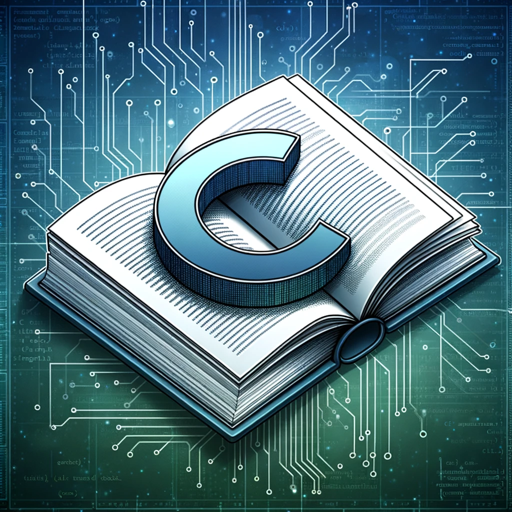C-AI-Powered Programming Assistant
AI-powered C programming made simple
How do I create a database in C?
Show me an algorithm for sorting in C.
Explain pointers in C.
Help me optimize this C code snippet.
Related Tools
Load More
C# (Csharp)
Your personal highly sophisticated C# (Csharp) language copilot, with a focus on efficient, scalable and high-quality production C# code.

C++ (Cpp)
Your personal highly sophisticated C++ (Cpp) copilot, with a focus on efficient, scalable and high-quality production code.

C Programming Language
C programming expert with deep knowledge of the language and its best practices
C# Expert
Direct C# expert for precise, actionable coding advice.

code: python java html react web c+ (copy)
The worlds most powerful coding assistant.

C++
The first expert in C++. Can utilize Compiler Explorer (godbolt) to compile & run programs, and cppinsights for code transformations.
20.0 / 5 (200 votes)
Introduction to C Programming Language
The C programming language, developed in the early 1970s by Dennis Ritchie at Bell Labs, is a general-purpose, procedural language that has influenced many other programming languages such as C++, Java, and Python. It was designed to provide low-level access to memory, a minimal runtime, and efficient mapping to machine instructions. This makes C particularly well-suited for system programming, such as operating system or compiler development. C is known for its simplicity, reliability, and portability, allowing programmers to write code that can run on various hardware platforms with minimal modification.

Main Functions of C
Standard Input and Output (I/O)
Example
Using functions like printf() and scanf() to handle user input and display output.
Scenario
In a console application, printf() can be used to display text and variables to the screen, while scanf() allows the program to receive user input. For instance, in a simple calculator application, printf() might be used to display a prompt for the user to enter two numbers, and scanf() would read these numbers for subsequent operations.
Memory Management
Example
Functions like malloc(), calloc(), realloc(), and free() to dynamically allocate and deallocate memory.
Scenario
In a program that requires dynamic data structures like linked lists or trees, malloc() can be used to allocate memory for new nodes as needed. After processing, free() is used to deallocate memory to avoid memory leaks. For example, a dynamic array implementation might use realloc() to resize the array as elements are added.
File Handling
Example
Functions like fopen(), fread(), fwrite(), and fclose() to perform file operations.
Scenario
In a data processing application, fopen() can be used to open a file containing data to be read. fread() reads the data into memory, where it can be processed, and fwrite() might be used to write results back to a file. For instance, a program that processes student records might read data from an input file, sort the records, and write the sorted data to an output file.
Ideal Users of C Programming Language
System Programmers
System programmers who develop operating systems, embedded systems, and real-time systems benefit significantly from C's low-level capabilities and efficient performance. C's ability to manipulate hardware directly, manage memory explicitly, and interact closely with the operating system makes it ideal for these tasks.
Application Developers
Application developers who require performance-critical applications, such as game developers and high-frequency trading system developers, use C for its speed and efficiency. C's lightweight runtime and fine-grained control over system resources allow developers to optimize their applications for maximum performance.

Guidelines for Using C
Visit aichatonline.org for a free trial without login, also no need for ChatGPT Plus.
Start your journey with C by accessing a comprehensive trial that requires no initial commitment.
Set up your development environment.
Install a C compiler such as GCC, and use an integrated development environment (IDE) like Visual Studio Code for a streamlined coding experience.
Learn the basics of C syntax and structure.
Familiarize yourself with fundamental concepts like data types, control structures, functions, and pointers to build a solid foundation.
Practice by working on small projects.
Start with simple programs like calculators or file handling to apply your knowledge and improve your coding skills.
Explore advanced topics and optimize your code.
Dive into complex areas such as memory management, concurrency, and algorithm optimization to enhance your proficiency and efficiency in C.
Try other advanced and practical GPTs
C++
AI-driven C++ coding solutions

C# Expert
AI-powered C# development assistance.
Qlik SaaS
AI-powered insights for smarter decisions.

Create Similar Image / Picture with AI
AI-powered Image Duplication Made Easy

Event Finder
AI-powered global music event discovery.

Prompt Crafter
AI-powered precision for crafting perfect prompts

C++
AI-driven C++ programming assistant.

C++
AI-powered C++ Copilot

C HELPER
AI-powered C programming assistant.

C# Sage
AI-Powered C# Coding Assistant

Leet Code(C++ Version)💻
AI-powered C++ problem solver.

Peanutize Me
Transform your photos into Peanuts characters with AI.

- Game Development
- Algorithm Design
- Embedded Systems
- System Programming
- Network Programming
C Programming Q&A
What are the key features of C programming?
C is a high-level, procedural language known for its efficiency, portability, and rich set of built-in operators and functions. It provides low-level access to memory and is widely used for system programming.
How does C handle memory management?
C allows manual memory management using functions like malloc(), calloc(), realloc(), and free(). This gives programmers fine-grained control over memory allocation and deallocation.
What is the importance of pointers in C?
Pointers are crucial in C as they enable direct memory access and manipulation, facilitate dynamic memory allocation, and are essential for implementing data structures like linked lists and trees.
How can I debug C programs effectively?
Use debugging tools such as GDB (GNU Debugger), employ print statements to track variable values, and write test cases to identify and fix bugs systematically.
What are some common use cases of C programming?
C is commonly used in developing operating systems, embedded systems, compilers, network drivers, and other performance-critical applications.